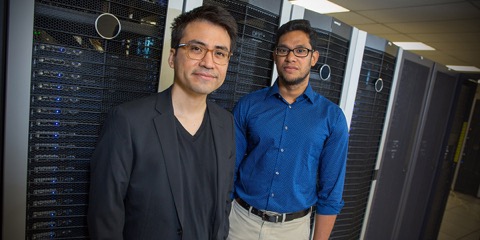Headlines
Contact DSC Public Relations
In the effort to mitigate destructive wildfires, wildland managers often fight those uncontrolled fires with prescribed fire — carefully controlled burns to safely eliminate the vegetation that piles up on forest floors and adds to potential fuel.
Prescribed fires are an important tool for managing fire-prone landscapes, but they come with a cost. Fire makes smoke, which carries tiny, unburnt particles through the air, lowering air quality and making breathing more difficult.
A $2.2 million Department of Defense grant will fund an FSU investigation into the dynamics of smoke from prescribed burns, giving land managers a better understanding of when and how to best use the technique.
- Details
A Florida State University computational biology researcher has been named a fellow of the American Association for the Advancement of Science, a lifetime distinction that honors contributions to science and technology.
The AAAS named Peter Beerli, a professor of scientific computing, as one of 443 new fellows of the association. The new fellows represent scientists from neuroscience to psychology to social, economic and political sciences. The honor recognizes pioneering research, leadership within a given field, teaching, mentoring, fostering collaborations and advancing public knowledge of science.
- Details
Double STEM major brings awareness to mental health on campus
Major: Biomathematics and Computational Science
Graduation: Spring 2020
“Florida State has given me extraordinary research and leadership opportunities. I believe I have the skills to not only be a great scientist, but to be a great person because of my experiences here.”
Senior Jack Fox Maria Keen is applying their research experiences in the STEM field at Florida State University to help advance mental health awareness. A native of Parkland, Florida, Keen transferred to Florida State in fall 2017 after graduating from Tallahassee Community College with Honors and an associate’s degree. “That’s when I realized there was this whole realm where you can combine math and biology, which is what I really enjoy doing,” Keen said.
- Details
The Department of Scientific Computing announces its sponsorship of the HackFSU 6 event to be held Friday, October 18 through Sunday, October 20, 2019 at Dirac Science Library.
- Details
A Florida State University and Cornell University research team found that batteries built from inexpensive and safe components can deliver three to four the punch of batteries built with today’s state-of-the-art lithium ion technology.
The researchers' work is published today in Nature Communications.
- Details


